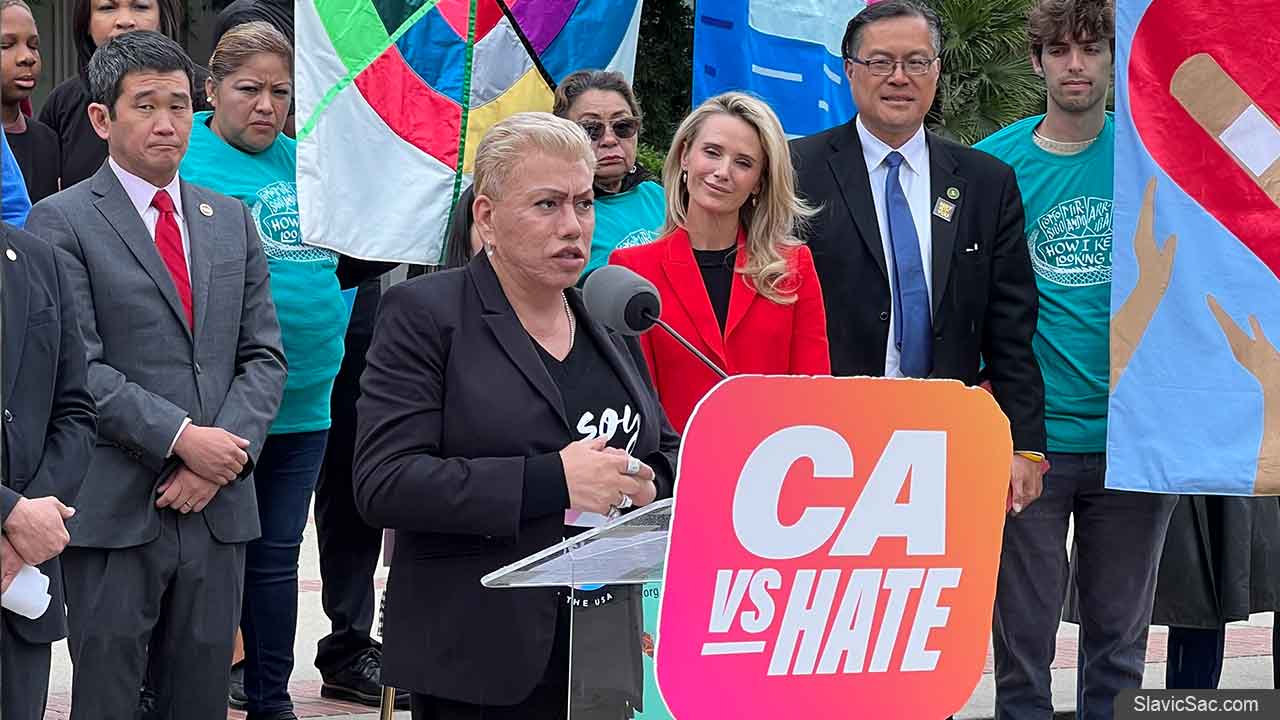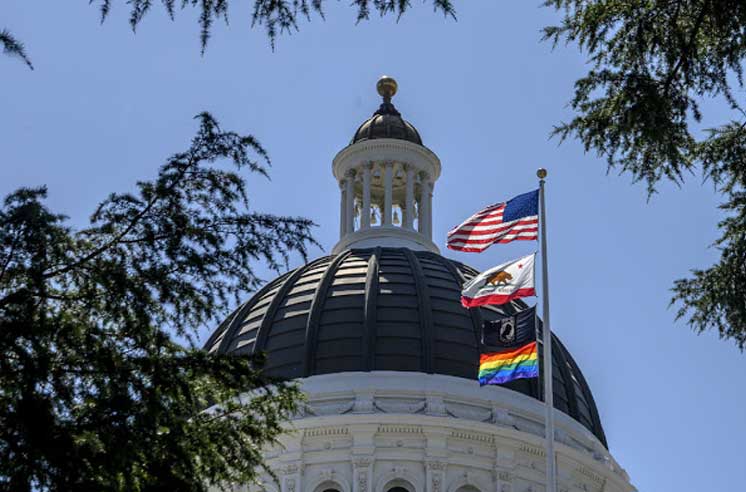
In the picture: Bamby Salcedo, President and CEO of the TransLatin@ Coalition and Vice Chair for the California Commission on the State of Hate, Jennifer Siebel Newsom, First Partner, Al Muratsuchi, Assemblymember
SACRAMENTO – On May 4th, in response to a rise in hate crimes and at the start of Asian & Pacific Islander Heritage month, Governor Gavin Newsom, along with the California Civil Rights Department (CRD), announced the official launch of CA vs Hate, a consolidated source of support for victims and witnesses of hate acts. It’s a new multilingual statewide hotline in 200 languages and website in 15 languages that provides a safe, anonymous reporting option for victims and witnesses of hate acts.
“Here in California, we are sending an unequivocal message that hate will not be tolerated,” said Governor Newsom. “We stand firm for a California for All and it is important that we hold perpetrators accountable for their actions and provide resources for those individuals victimized by hate crimes. Now, Californians have another tool to ensure that not only justice is served, but that individuals have access to additional resources to help deal with the lingering wounds that remain after such a horrendous crime occurs.”
The California Civil Rights Department (CRD) is dedicated to combating hate incidents and hate crimes. CRD is also home to the Commission on the State of Hate, created by the California Legislature to strengthen California’s efforts to stop hate and promote mutual respect among California’s diverse population.
“California is strong because of our diversity but hate-fueled violence remains a persistent and growing threat,” said Civil Rights Department Director Kevin Kish.
Why Ca vs Hate launched
CA vs Hate is in direct response to the rise in reported hate crimes in California, which in recent years, reached their highest levels since 2001 – jumping almost 33% from 2020 to 2021.
However, the majority of hate crimes and incidents remain underreported to law enforcement agencies, and these statistics do not reflect the real situation.
“In California, our diversity is what makes the nation’s most populous state a beautiful and vibrant community,” said First Partner Jennifer Siebel Newsom at an event in Sacramento launching this new program on May 4th. “It’s horrifying that hate crimes are on the rise, and so let it be made clear: we stand with our diverse communities, and we are committed to ensuring they feel safe and heard. There is no room here for bigotry and hate-fueled violence.”
This new state-wide program will help individuals and communities targeted for hate including Asian Americans, Latinos, Black Americans, LGBTQ+ individuals, religious minorities, elderly people, disabled people and other vulnerable communities.
that make up California’s diversity and strength. Hotline services are confidential and provided for free, regardless of immigration status. These services are offered in a culturally competent manner and will help people identify options and next steps after a hate incident or hate crime has occurred. Hate acts can be reported in 15 different languages through the online portal and in over 200 languages when calling the hotline.
“I urge all Californians to know their rights and to take advantage of these important resources,” said CRD Director Kevin Kish.
Why is Ca vs Hate substantial for immigrants from the post-Soviet space?
The governor’s new program is directly related to immigrants from the post-Soviet space, because we also face hate incidents and crimes. It is quite common for the Slavic immigrants to encounter this act within their own community, congregation, or even within their families.
However, not everyone understands what an incident or a hate crime is, how to acknowledge it, stop it, and, no less important, how victims of such incidents live after experiencing a hate act.
A hate incident is a hostile expression or action that may be motivated by bias against another person’s actual or perceived identity(ies). There are two main kinds of hate incidents – (1) acts of hate that are not crimes but violate civil rights laws, and (2) acts of hate that may not violate the law but still cause significant harm in a community.
Perpetrators may be motivated by different discriminatory biases, including, but not limited to, bias on the basis of race, color, disability, religion, national origin, sexual orientation, or gender, including gender identity.
Some examples of hate incidents can include: derogatory name calling, bullying, hate mail, and refusing service.
For example, if you profess Islam, wear appropriate headgear and clothes, and someone says to you “terrorist” or “shahid”, this is a hate incident.
Or, caustic “pagans” to, for example, Orthodox or Catholics; unacceptable “Yids” towards Jews, or other derogatory and offensive names for certain ethnic groups, drawing a swastika on the walls of Jewish schools or synagogues; hints and suspicions, and sometimes directly calling you a “KGB-ist”, “Russian spy” or “matryoshka” addressed to a Russian-speaking girl of Slavic appearance, implying prostitution; or because of not knowing English, you were not served, for example, in a cafe – those are also examples of hate incidents.
Insulting or humiliating posts on social media towards members of the LGBTQ+ community because their appearance or behavior do not match someone else’s idea is also an example of a hate incident.
Discrimination in the workplace or in the provision of housing (for example, housing is provided only to married cisgender couples); charging men and women different prices for similar services, such as haircuts or dry cleaning; human trafficking, including the use of forced labor (this can happen to undocumented immigrants), sexual harassment, etc. – these are cases that are in the plane of hate-motivated incidents.
The victims of incidents and hate crimes can be both women and men, the elderly and students of all ages; people with mental health disabilities or learning disabilities, such as dyslexics.
In other words, hate incidents and hate crimes don’t just affect the Black American, Asian American, or LGBTQ+ communities, they can literally affect anyone.
Hate incidents often result in hate crimes. Under California law, a hate crime is a criminal act committed, in whole or in part, because of one or more of the following actual or perceived characteristics of the victim: disability, gender, nationality, race or ethnicity, religion, sexual orientation; or because of the person’s association with a person or group with one or more of these actual or perceived characteristics.
An example of a hate crime among Slavic immigrant community is the murder of a transgender girl in 2019, which caused changes in the legal landscape of the state of Washington.
Therefore, if you, your friends, acquaintances, relatives, colleagues are faced with anything similar mentioned above – you can get free help on Ca vs Hate.
What help resources available on Ca vs Hate
Any victim of or a witness to a hate incident or crime in California can report and receive free support any time using this link regardless of immigration status.
Importantly, the state has ensured that these services are offered in a culturally sensitive way to help people determine the next steps after they experienced a hate incident or crime.
The California vs Hate program is not affiliated with law enforcement, and you can report an incident anonymously and not fear retaliation from the abuser.
Any victim or witness of a California hate incident or crime can report online in 15 languages (not available in Russian or Ukrainian so far) and receive support at any time.
Monday to Friday from 9:00 a.m. to 6:00 p.m., you can call the hotline and access support in more than 200 languages, including Russian:
833-8-NO-HATE
(833) 866-4283
Callers will be connected with a professional trained in culturally competent communication and trauma-informed practices.
If outside of those hours, you can leave a voicemail, or you can call 211 to report hate and seek support.
If you want to report a hate crime to law enforcement immediately or you are in present danger, please call 911.
The California Department of Civil Rights website provides explicit information on available support, including legal, financial, mental health, and mediation services. The information is available in 15 languages, among which there are no Russian or Ukrainian languages yet. Whether you report online or by phone, you will be contacted by a care coordinator who will follow up with you to ensure you are able to access resources.
In addition to seeking help online or by phone, you can also make a difference by becoming a program partner and helping victims of hate incidents or hate crimes by writing to [email protected].
Why is it important to report an act of hate?
To stop the normalization of hate in our communities, make them safer and ensure impacted individuals receive the help they need.
Anyone can become a victim of an act of hate, so it’s in the interests of the community to stop the growth of hate-motivated violence, which so far remains both an external and internal threat to the community of immigrants from the post-Soviet space.
Elena Kuznetsova, SlavicSac.com





